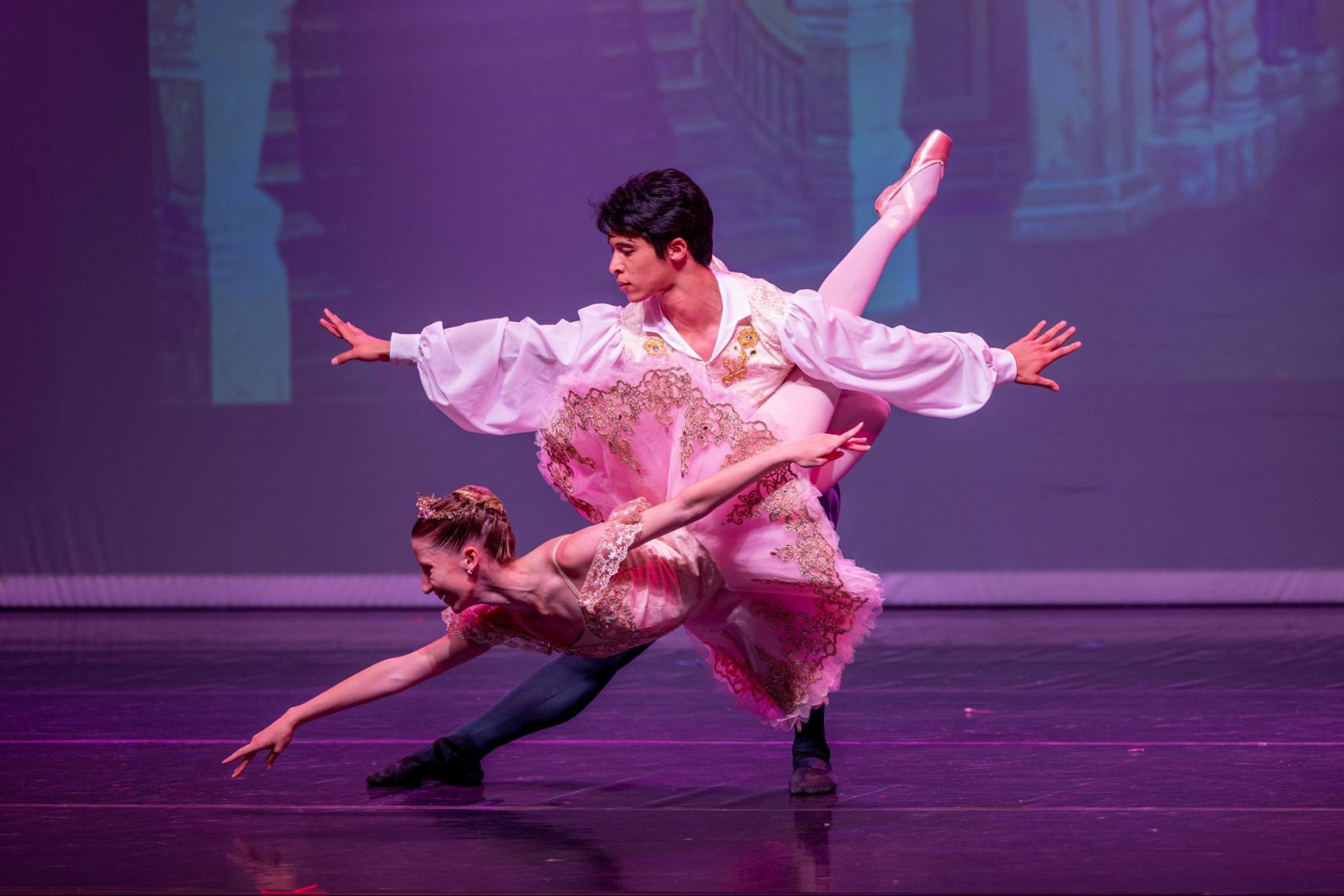Last Saturday, the Cardinal Ballet Company (CBC) put on its spring production of “Sleeping Beauty,” a spectacle of gestural storytelling. The thick red velvet curtains of Dinkelspiel Auditorium unveiled four acts of skillful dance and shimmering costumes, each more enthralling than the last. The performance was rendered especially remarkable by the fact that it was chiefly organized by students — from the costumes to rehearsal management.
For its production, the CBC adapted Tchaikovsky’s “The Sleeping Beauty,” whose music is widely known thanks to the popular 1959 Disney film. In the ballet’s prologue, evil fairy Carabosse (Lucy Rikerich ’22) curses the newly born Princess Aurora (Ellie Prince ’22): come her 16th birthday, she will prick her finger on a spindle and die. A mitigating spell from the benevolent Lilac Fairy (Sorcha Whitley ’23) alters Aurora’s destiny to a deep sleep, curable only by a true love’s kiss.
Indeed, in Act I the tragic prophecy comes to pass. Act II takes place a century later when the Lilac Fairy sends Prince Florimund (Bradley Moon ’25) a vision of Aurora and he journeys to save her. Finally, the two get their happy ending in the final act — their wedding.
Throughout the night, company members moved creatively to communicate their characters’ personalities solely through dance.
Rikerich’s Carabosse strode boldly onto the stage, cane in hand, disrupting the celebration of baby Aurora’s birth in a striking entrance. Her performance was further characterized by a sinister, maniacal grin and a towering, ramrod-straight posture. When dancing with her small posse of rat minions (Andrea Dahl ’21, Emily Okabe ’24, Britta Verhey ’25 and Lindsay Wu ’24), Rikerich contorted into a hunched position, her neck outstretched as she bounded around a circle of cowering side characters.
In lieu of words, Carabosse’s character mimed her calamitous curse for the audience by theatrically drawing her forearms into an “X.” Rikerich stalked toward Aurora’s baby-bundle-bearing parents, her character’s malice oozing from every pore.
Whitley’s Lilac Fairy echoed this “X” motion, but gave it a distinct soft quality to signal the modification of the spell. With an elegant, swanlike solo and a knowing tap on the temple, the Lilac Fairy ousted Carabosse from the stage.
Company members also showcased a range of technical skills throughout the performance. Some of the most visually stunning choreography came during the final act, when smaller groups of between one and three dancers executed character spotlight sets.
Prince’s Aurora moved with a classic ‘delicate yet precise’ dancing style. Moon’s Prince Florimund guided her through a flow of dips and spins for their Wedding Pas de Deux partner choreography, peppered with the occasional lift or arabesque. Moon boasted gravity-defying feats during his Prince Variation solo, seeming to hover above the ground in an airborne tableau. The audience applauded its loud admiration for the final series of leaps that took Moon in a sprawling circle around the stage.
Folklore characters entered the story as cameo wedding guest characters, including Puss in Boots (Siranush Babakhanova Ph.D. ’25 and Kealia Victorino ’24) and Red Riding Hood (Andrea Dahl ’21). Trudy Kim ’23 delivered an impressive performance as Cinderella, balancing “en pointe” for nearly her entire set. The picture of composition and femininity, Kim ended her solo with a neat series of turns.
Dynamic trio performances by the Jewels (Jared Klegar ’24, Lian Sternler ’22 and Lindsay Wu ’24) and the Bluebirds (George Song ’25, Ellie Wong ’23 and Emily Okabe ’24) also proved to be fan favorites. The three members of each trio performed in unique combinations that seemed to play to each dancer’s strengths.
Artistic Director Abigail Graber ’22 said she and Prince — who was also the Executive Director — put countless hours into the planning of the ballet, from assigning each dancer the perfect role to setting rehearsal times around company members’ hectic schedules. Students put together the show’s choreography by adapting performances from the world-renowned Royal Ballet and Teatro alla Scala to fit the capacity of the company.
The company’s array of jaw-dropping costumes were among the most notable elements of the show. According to the directors, Costume Coordinators Kim and Whitley applied for grants to allow the group to expand its costume closet.
For Graber, the expensive tutus were a worthwhile investment.
“You come to Stanford and have all these other endeavors that you do that feel very professional and like at the highest level. We want to make sure the ballet here feels the same,” she said. “Even if you don’t want to do ballet professionally, we want you to feel like you’re being taken seriously and doing something that’s really worth your time and really special.”
Although there was the occasional fall or stumble, the dancers’ training shone through and allowed them to jump back into the choreography seamlessly. The Cardinal Ballet Company succeeded in bringing “Sleeping Beauty” to life, a testament to its members’ talent and the dedicated planning behind every scene.
Editor’s Note: This article is a review and includes subjective thoughts, opinions and critiques.
